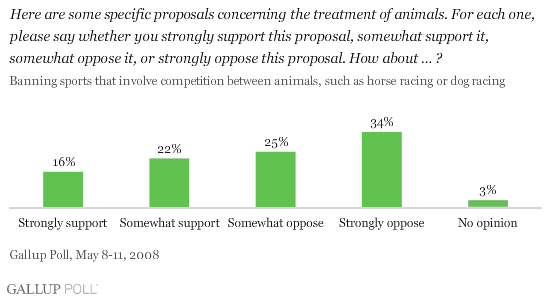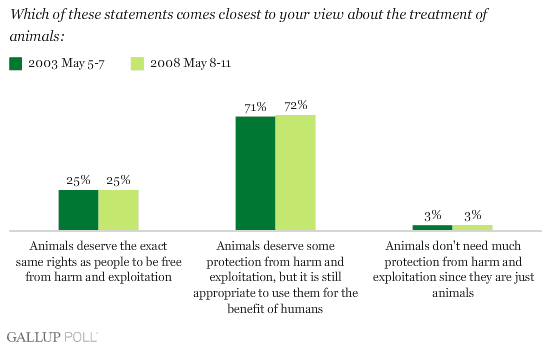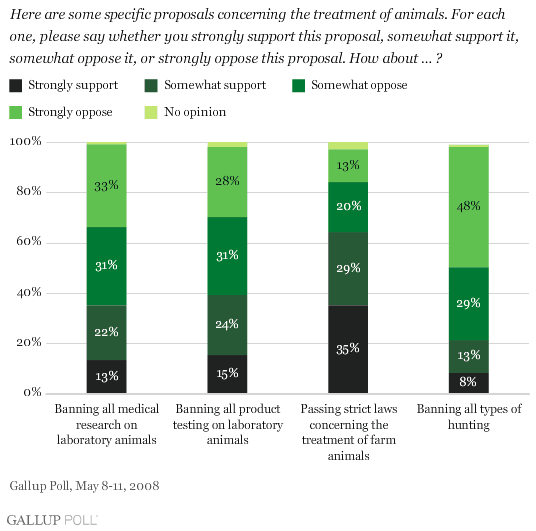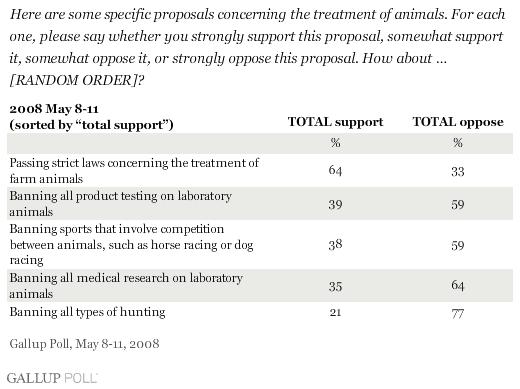PRINCETON, NJ -- At the height of Triple Crown season and following the euthanizing of Kentucky Derby second-place finisher Eight Belles, almost 4 in 10 Americans say they favor banning sports that involve competition between animals, such as horse racing or dog racing.

Concern over horse racing has come to the forefront in the past week following the running of the Kentucky Derby, when the horse Eight Belles was put to death on the racetrack after breaking both of her ankles shortly after completing the race. This week's running of the Preakness provides a continuing catalyst for observers to question the degree to which the sport involves the inhumane treatment of the horses. Although this type of discussion has tended to center on reforms rather than outright banning of horse racing, Gallup's annual Values and Beliefs Social Survey, conducted the weekend after the Derby, shows that 38% of Americans express support for the idea of banning horse and dog racing altogether.
Unlike attitudes toward other moral issues such as abortion, euthanasia, and gay rights, there are relatively few significant differences in attitudes toward a ban on horse and dog racing among various demographic segments. Women are slightly more in favor of banning racing than are men, and those 18 to 29 favor a ban slightly more than do older age groups. There is little difference in these attitudes by church attendance or by political party.
In addition to the question about banning horse and dog racing, the annual Values and Beliefs survey updated a broader question about the treatment of animals, last asked in 2003. A quarter of Americans say animals deserve the same rights as humans, while almost all of the rest agree that animals should be given some protection from harm and exploitation.

This basic attitude toward the treatment of animals today is virtually the same as it was five years ago.
At the same time, additional questions show that -- as was the case for horse or dog racing -- a minority of Americans are willing to go so far as to advocate an absolute ban on certain activities involving animals, including product testing and medical research. Americans are most opposed to an all-out ban on hunting.

A separate question found that almost two-thirds of Americans are in favor of "passing strict laws concerning the treatment of farm animals." This proposal may have been easier for Americans to agree with than the questions asking about bans. When Gallup last asked about this, 62% were in favor, but the percentage who strongly support such laws has increased from 29% to 35%. Earlier this year, video footage of maltreatment of cows at slaughterhouses made the news.

Summary
Relatively few Americans advocate going so far as to accord animals the same legal rights as humans, although a large majority do favor affording animals some protection. A large majority also favor strict laws on treatment of farm animals. Substantial minorities of Americans go so far as to advocate an outright ban on horse and dog racing, and on the use of animals for medical testing and research.
Survey Methods
Results are based on telephone interviews with 1,017 national adults, aged 18 and older, conducted May 8-11, 2008. For results based on the total sample of national adults, one can say with 95% confidence that the maximum margin of sampling error is ±3 percentage points.
Interviews are conducted with respondents on land-line telephones (for respondents with a land-line telephone) and cellular phones (for respondents who are cell-phone only).
In addition to sampling error, question wording and practical difficulties in conducting surveys can introduce error or bias into the findings of public opinion polls.
To provide feedback or suggestions about how to improve Gallup.com, please e-mail feedback@gallup.com.
